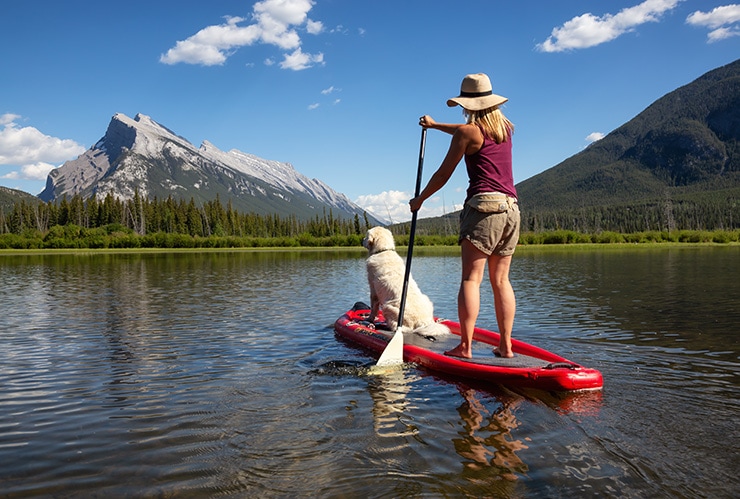Going paddle boarding with your furry best friend? Why not?
Everyone needs to spend some time outside for their physical and mental well-being. That includes your dog. So why not do something nice together–something like SUP!
It allows you to escape the monotony of daily life and get some sun. Besides, stand up paddle boarding is a good workout with tons of benefits. And your pup too can get a good workout from swimming.
But you need to make sure that both you and your dog are safe and having fun. That means proper preparation
To help you out, I put together the ultimate guide on how to paddle board with your dog.
So keep reading.
Should I Take My Dog Paddle Boarding?
This is a good question and you’re the only one with the right answer because you know your dog better.
But paddle boarding is a pretty safe sport and most dogs would love it. They need the break as much as you do.
Just make sure you prepare well so your paddling sessions can be smooth.
Getting Ready for a Paddle with Your Pooch: What You Need
First, let’s talk about the necessary paddle boarding gear and other essentials when paddle boarding with your furry friend.
Make Sure Your SUP is Suitable
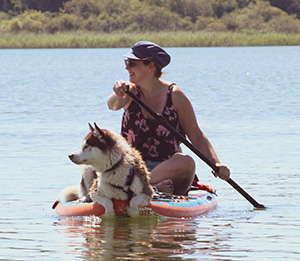
A good paddle board is key.
Find a paddle board that is stable and big enough for you and your dog. The main determinant of a board’s stability is its width. So narrow racing and touring boards may not be a good idea. They’re usually tippy. Add an excited dog to the equation and it just becomes too unstable.
I suggest a paddle board that’s over 32 inches wide and at least 10 feet long.
Another thing you should consider is the SUP’s weight limit. Every paddle board has a set weight limit and yours should be able to handle you, your canine companion, and your luggage.
There’s also the question of inflatable boards vs hard boards. Which one is right for dogs?
The main benefit of solid boards is that they offer better performance for people who want to do paddle racing and surfing. This doesn’t really matter when you just want a SUP board for you and your dog though.
Inflatable paddle boards are made using tough PVC and the quality ones are super durable. They are dog-friendly because you don’t have to worry about your dog scratching and causing real damage.
Lastly, a grippy surface is a must. You don’t want your dog to slide off the wet paddle board. This is another reason why inflatable boards are the better choice. Most of them have a large deck pad which provides a surface big enough for you and your furry friend.
Get a Life Jacket for Your Pup
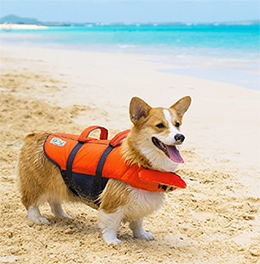
Even though your dog can swim and he loves the water, a dog life jacket is still an essential safety accessory.
As mentioned, paddle boarding is a safe sport and you don’t have much to worry about. But accidents happen and you’ll be at peace knowing that your pup is safe if things go south.
A life jacket ensures that he remains afloat when he falls into the water.
Besides, you can expect your dog to jump into the water from time to time. Dog life jackets usually have a handle that you can use to safely help him back onto the board.
Get the flotation device in advance and have him try it on at home so he can get used to it. Be sure to make any necessary adjustments so your dog feels comfortable wearing it for a long period of time.
Treats and Enough Drinking Water
The risk of dehydration is higher when you’re out in the sun, being physically active. Plus, if you’re paddling in salt water, your dog may try to drink it. This won’t help as it further raises the risk of dehydration.
Dogs can also get heat stroke, especially puppies and older dogs.
Make sure you bring a lot of fresh drinking water for the both of you.
You’ll also need treats to reward good behavior and encourage safe paddle boarding habits.
Preparing Your Dog for Paddle Boarding
It’s important to take some time and prepare your dog for SUP. If it’s not something he has done before you want to make sure that he’s comfortable, happy and relaxed.
The experience will be so much fun if your dog loves it just as much as you do.
Have His Nails Trimmed
Long nails for dogs can be uncomfortable and, sometimes, painful. On top of that, a dog with long nails may scratch your paddle board.
Now, long dog nails will most likely not cause any serious damage, especially if you have an inflatable SUP. But they might leave visible scratch marks. They might also scratch and tear the soft deck pad on your paddle board.
Help Him Get Familiar with the Board
Your dog may need time to get used to the paddle board because he’ll probably not want to immediately jump on to something strange.
Keep the paddle board around the house and let the dog see that it’s harmless. Don’t force him to get on it or even close to it. Just allow him to get used to it at his own pace.
It’s okay to use treats to encourage him. For example, you can put treats on the SUP board so that he has to go on the paddle board to get his treat. Do this a few times and he’ll see that getting on the SUP board is a good thing.
With time he may even get on the SUP and sit on his own.
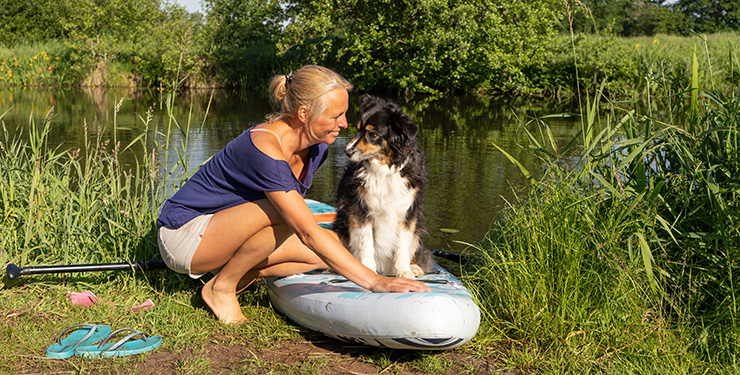
Spend More Time in the Water with the Dog and Teach Him to Swim
Contrary to popular belief, not all dogs can swim well. Others don’t like to go near the water at all. If your dog is like this, you can’t just put him on the board and start paddle boarding. You’ll both have a horrible SUP adventure.
Do more activities that involve being in or around the water to make him comfortable. You don’t want your dog to panic if he ends up in the water while you’re paddling with him.
If he can’t swim at all, you should consider talking to a dog trainer.
Having a pup that can swim well and loves the water will help you have a great time paddle boarding with him.
It’s also a safety issue. If your dog jumps or falls into the water you want to know that he will be okay and won’t be terrified.
Train Your Pooch with the Necessary Commands
Having your dog master the necessary commands will enable you to have a smooth and safe experience while paddle boarding.
First, there are the basic commands–“sit”, “come”, “stay”, and “no”–which, hopefully, your pup has already mastered.
Come up with commands for getting on and off the SUP. He should be able to stay on the board when you’re paddle boarding; otherwise, you’ll have a frustrating experience.
It won’t be fun if your dog keeps jumping off after every little interesting thing or animal he sees. He may even cause you to fall off, more so if he’s a large dog. Make sure he understands that he can only jump off when you tell him to.
Practice the commands until he gets it. Try to have him stay on the board a little longer each time so he won’t get restless when you’re doing the actual paddle boarding.
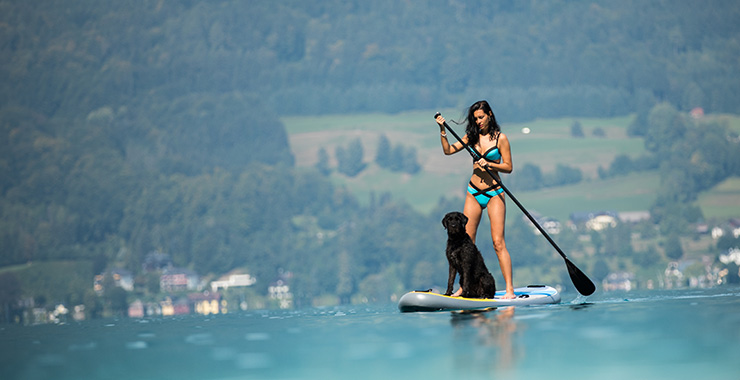
Try SUP on Dry Land Together
Next, do a “SUP session” on dry land.
Have the dog wear his life jacket and get on the paddle board with him. Show him his spot. Large dogs should sit close to the center of the SUP board to make it easier for you to maintain balance. Small dogs can sit at the front, center, or back. If your board is stable it won’t really matter.
Sit on the SUP board for a while with your pup and maybe rock it a little with both of you on board. You can then stand and try to do paddling motions with your paddle so he can get used to it.
Ready for the Water!
So, now your furry friend loves being around the water and he can swim. He also doesn’t mind being on the board and the paddle moving around him doesn’t bother him.
It’s time for the next step–the actual paddle boarding!
Stand Up Paddle Boarding with Your Dog
Here are a few tips to help you have a fantastic time paddle boarding with your dog.
Wear Him Out If He’s a High-Energy Dog
Paddle boarding with your pooch will be more fun and peaceful if he can sit still for a while. But that’s hard to do for energetic dogs. To spare both of you the agony, do something that will wear him out.
Try different games and maybe even a swimming session before you start paddling. He can’t be restless on the paddle board if he’s tired.
Take the SUP to the Water without the Pup First
At this point, your dog loves the SUP and the water, but he hasn’t been on a board that’s on the water.
So you can leave him at the shore and take the paddle board out into the water alone, just close to the shore. Show him you’re having fun and that there’s nothing for him to be afraid of.
You can then call and have him come to you or go back and get him on the SUP. Then go into the water together.
Find Your Balance with Both of You on the Paddle Board
Finding and maintaining balance may not come easily for you with a dog onboard especially if you’re not a strong paddler. It might also be harder with bigger dogs.
If you find yourself having trouble with balance, start by paddling while on your knees. The lower center of gravity will give you extra stability. Also, have the dog sit at your feet and be careful not to hit him with the paddle while paddling.
The Dog Will Most Likely Jump Off the SUP, Be Ready
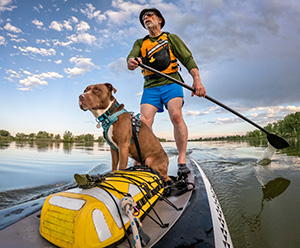
Even with all the training, you should still expect your dog to jump off.
This may not be a problem with small dogs, as long as they have a life jacket and you can pull them back up.
The situation is different with larger dogs because you can easily find yourself in the water when they jump.
The best thing is to teach your dog to only jump when you say so. If he loves the water make sure you let him jump off a few times. Brace yourself by getting on your knees for more stability.
Keep the First Trip Short
Don’t get carried away the first time because your dog still needs some time to get used to paddle boarding. Keep the trip short and fun so he’ll want to do it again.
Remember to practice the same commands in the water so he can completely get it.
It Probably Won’t Be Easy
Don’t expect things to go perfectly at first. Your canine companion may not be as excited as you are and that’s okay. Ensure that he’s comfortable, and don’t force anything. He may grow to love it.
He may also make mistakes and jump in a few times without your permission. Try to be patient and don’t get frustrated.
Key Tips for a Safe SUP Session with Your Furry Friend
Safety should always come first when you’re in the water.
Your Dog Needs Sunscreen Too
Dogs, just like humans, can get sunburns and other sun-related issues. So as you protect yourself remember to protect your best friend too.
Some dogs are more at risk than others. It’s important to know and understand your dog in order to get them the sunscreen that’s best for them.
A Leash for You and PFDs for the Both of You
Before you get on the water make sure you’re wearing your life vest and a leash.
Your leash keeps you attached to your stand up paddle board. If you fall off, it won’t drift away and you can get back on and help your dog back on the board.
The life jacket is designed to keep you afloat. Both you and your dog need one. Your dog will be safe even though he accidentally hits his head while jumping or falling.
Don’t Forget Your First Aid Kit
A first-aid kit is a good thing to have on your SUP, and not just for longer paddles. It will come in handy if one of you has a minor injury. You won’t have to wait until you get back to shore.
Rinse Your Dog with Fresh Water When You’re Done
Give your dog a good rinse with fresh water to get rid of salt water or sand which may cause irritation. If he has sensitive skin or long hair, then a full bath would be more suited.
The Benefits of SUPing with Your Pup
Stand up paddle boarding is a fun and peaceful activity that benefits both you and your dog. It’s a good way to spend time together, away from the distractions of daily life.
Unlike a kayak, a paddle board is not restrictive – so your furry friend can move around more easily.
Besides, your dog needs to exercise just as much as you do. So paddle boarding and a little swimming will do the two of you a lot of good.
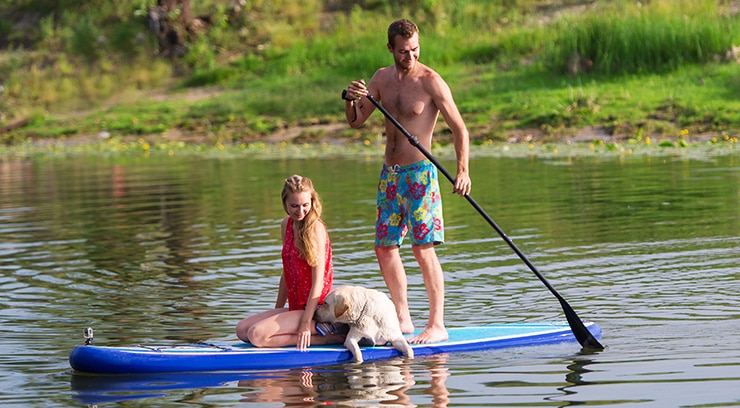
Frequently Asked Questions About Paddle Boarding with Your Dog
Do Dogs Like Paddle Boarding?
This depends. Some dogs naturally love the water and they will also love paddle boarding. Others will need you to introduce them gradually and they may come to love it.
Can My Pooch Learn to SUP: How Long Will It Take?
Yes, your dog can learn to paddle board–not necessarily to hold a paddle, although that would be cute. :-)
He can learn to be a passenger and enjoy paddle boarding with you. The whole process of learning can take a day or weeks. It depends on your dog and how he feels about the water. Just go at the dog’s pace and be patient with him. He will learn.
Are Inflatable Paddle Boards Durable for Dogs?
Yes, inflatable paddle boards are durable for dogs. The good ones are virtually indestructible and you don’t have to worry about your dog causing serious damage with his claws. I actually believe that inflatables are better for dogs than solid boards.
Is It Easier to Kayak or Paddle Board with a Dog?
Stand up paddle boarding with a dog is much easier than kayaking because there’s no cockpit to get in and out of, as with a sit-in kayak.
Your pup can get on and off the paddle board quite easily and he won’t feel restricted.
How Do I Get My Dog Back on a Paddle Board After Falling?
If your dog ends up in the water (which is a likely possibility), don’t panic. Your pup will be wearing a PFD, and there’s actually a knack to getting a dog back on a board after falling in.
- Position yourself properly at the center of your paddle board, ensuring that you have good balance.
- With your dog on the side of the SUP, slightly in front of you, grab the handle on his PFD.
- As he tries to climb on the board, use the handle to lift him and help him get back on.
- Wait until he’s completely on the SUP before letting go.
Conclusion
Stand up paddle boarding with your dog is fun and offers a great way for both of you to enjoy the great outdoors. But before you go, you should prepare for the experience so you can be safe and have a good time.
First, get the right board. This means a wide and stable board that can hold both of you. Make sure you get life jackets for you and your dog, and bring lots of water to prevent dehydration (and bring a few treats too).
Have the dog get used to the paddle board and his life jacket while at home. Teach him how to swim and love the water as well so he won’t be scared if he falls in or jumps off the board.
Lastly, remember to take it slow and just focus on making this fun for both of you.
Good luck!

